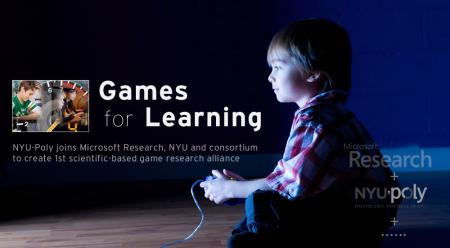Games for Learning: NYU-Poly joins Microsoft Research, NYU and consortium to create 1st scientific-based game research alliance
 |
While middle- and high-school students are well-versed in using technology for social networking and Internet research, there’s a continuing decline among teens in proficiency and interest in math and sciences — the very skills needed to prepare them for the new demands and requirements of the 21st century.
To address this decline and harness the popularity of video games and their ability to engage young people, Polytechnic Institute of NYU has teamed up with Microsoft Research, New York University, and a consortium of other universities to create a research alliance that will provide the fundamental evidence to support games as learning tools for math and science among middle-school students.
Craig Mundie, chief research and strategy officer at Microsoft Corp., unveiled details about the first-of-its-kind, multidisciplinary, multi-institutional gaming research alliance, Games for Learning Institute (G4LI), on October 7 at New York University’s Manhattan campus.
“Technology has the potential to help reinvent the education process, and excite and inspire young learners to embrace science, math and technology,” Mr. Mundie said. “The Games for Learning Institute at NYU is a great example of how technology can change how students learn, making it far more natural and intuitive.”
The core G4LI research team from NYU-Poly includes Carl Skelton, director of the Brooklyn Experimental Media Center and assistant professor of digital media, Katherine Isbister, associate professor of digital media, and Joel Wein, associate professor of computer science. Three graduate students will also be part of the team.
“NYU-Poly will be handling some of the core computer science issues like building logging/recording and analysis infrastructure so that we can really study in depth how students interact with and learn from these games,” explained Dr. Wein.
In addition, the team, which will be headed by Dr. Isbister, a leading researcher, instructor and author who studies games as teaching tools and the social psychological impact of gaming, will also contribute to G4LI’s investigation of what makes a game instructive and compelling, rather than simply entertaining.
This is not the first effort by Mr. Skelton and Dr. Wein to further the understanding and usefulness of games for learning. The two previously collaborated on an NSF-funded project to build a gaming infrastructure to teach students about complex networked systems.
Microsoft Research is providing $1.5 million to G4LI. NYU and its consortium of partners (NYU-Poly, Columbia University, the City University of New York (CUNY), Dartmouth College, Parsons, the Rochester Institute of Technology and Teachers College) are matching Microsoft’s investment, for a combined $3 million which will cover the first three years of the project.
The G4LI will work with a range of student populations, yet focus on underrepresented middle-school students, such as girls and minorities. The G4LI also will evaluate game prototypes and introduce them, along with accompanying curricula, to an existing network of 19 New York City area schools; results in the classroom will be tracked. Based on the findings, the G4LI’s goal is to expand its research and game development to all K–12 grades. Resulting scientific evidence will be shared broadly with researchers, game developers and educators.
Learn More
Microsoft Research: Games for Learning Institute Profile
New York University Games for Learning Press Release




